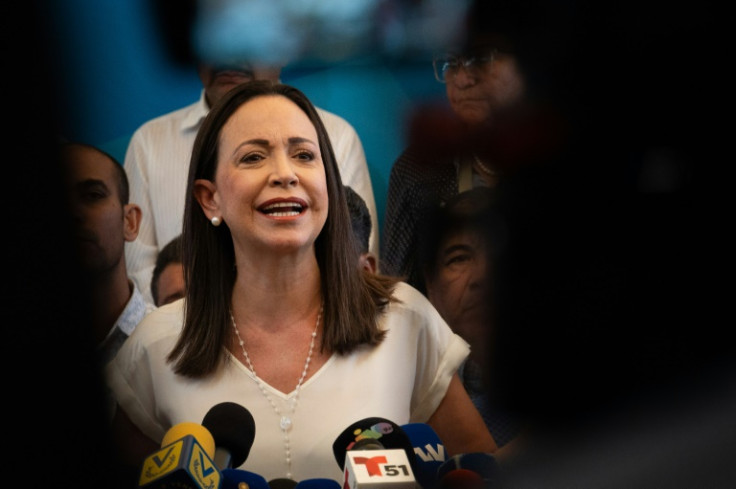
Venezuelan opposition leader Maria Corina Machado on Friday urged the international community to heap more pressure on President Nicolas Maduro's government to allow her coalition's chosen candidate to take part in July elections.
The 56-year-old politician thanked countries like Colombia and Brazil -- traditional allies of Caracas -- which joined the United States and France in expressing their alarm over the exclusion of candidate Corina Yoris.
"They reaffirm that our struggle is fair and democratic," Machado wrote on X, formerly Twitter.
"I call on the democratic leaders of the world to join the efforts of presidents and governments in demanding that the Maduro regime allow the registration of Corina Yoris as a candidate in the presidential elections."
Machado's Democratic Unitary Platform (PUD) was earlier this week forced to register an unknown candidate after being unable to sign up Yoris, 80, to face off against Maduro, who is seeking a third term in office.
Yoris was already the embattled opposition's Plan B.
Machado overwhelmingly won an opposition primary in October last year, but was banned from public office for 15 years by courts loyal to Maduro after being accused of corruption -- a charge she dismisses as fabricated -- and of supporting sanctions against his government.
On Thursday, French President Emmanuel Macron and his Brazilian counterpart Luiz Inacio Lula da Silva condemned the blocking of Yoris during a joint press conference in Brasilia.
"We very firmly condemn the exclusion of a serious and credible candidate from this process," Macron said.
Lula said there was "no legal or political explanation for banning an opponent from being a candidate."
"I told Maduro that the most important thing to restore normality in Venezuela was to avoid any problems in the electoral process, that the elections be held in the most democratic way possible."
Colombia's foreign ministry this week expressed its "concern" about "the registration of some candidacies," noting that "they could affect the confidence of some sectors of the international community" in the elections.
After being unable to register Yoris by the deadline, the PUD managed to slip in the name of a little-known former ambassador, Edmundo Gonzalez Urrutia, as a "provisional" candidate who Machado now hopes she will be able to replace.
Another candidate, Manuel Rosales, the governor of the oil-rich province of Zulia and a member of the PUD coalition, also managed to sign up last-minute -- though he has been accused of "betrayal" by Yoris for splitting the opposition vote.
Washington on Wednesday said that Venezuela's electoral council only accepted "opposition candidates with whom Maduro and his representatives feel comfortable."
State Department spokesman Matthew Miller said the move ran "counter to competitive and inclusive elections that the Venezuelan people and international community will view as legitimate."
However, Caracas ally China on Friday urged the international community to play a "positive and constructive role" in Venezuela's election, denouncing recent criticism of the summer election as "external interference."
"We respect Venezuela's national and sovereign independence, support Venezuela in advancing the election in accordance with its constitution and laws, and oppose external interference in Venezuela's internal affairs," said Chinese foreign ministry spokesperson Lin Jian.
Many countries, including the United States, refused to accept the results of Maduro's 2018 victory, alleging fraud and a lack of transparency. That vote was boycotted by the opposition.



